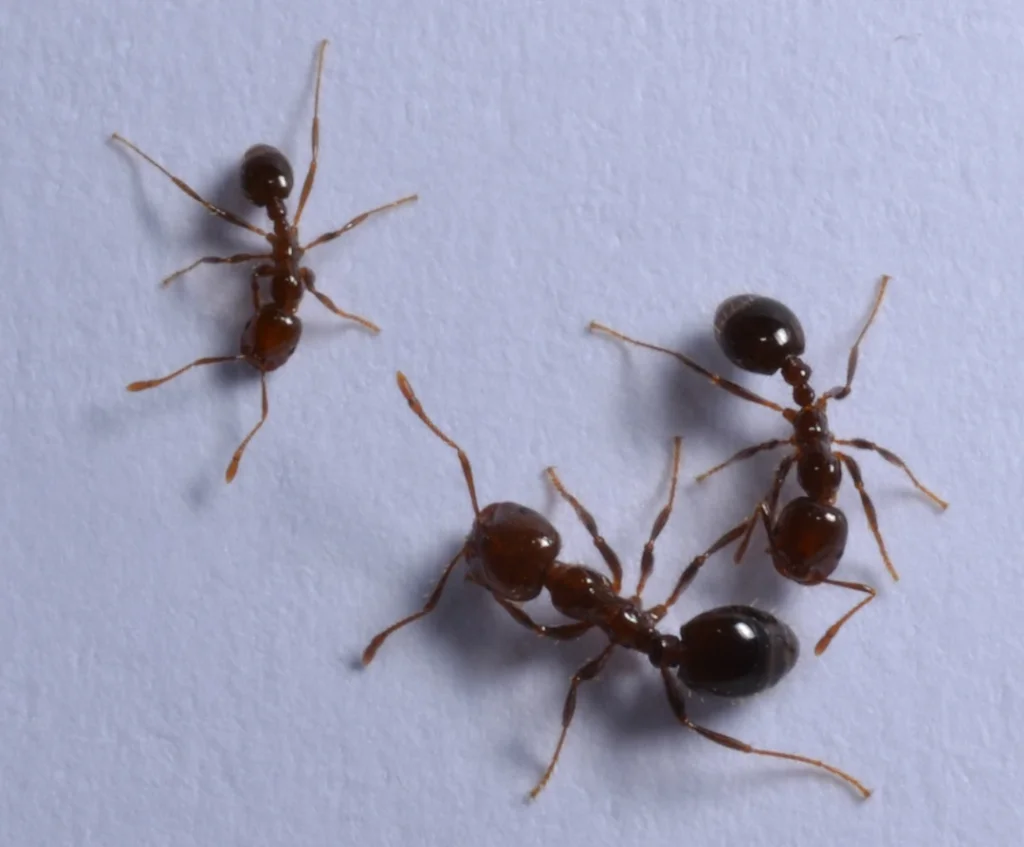
Pavement Ants in North Carolina
Pavement ants are a common pest in North Carolina, often found in pavement cracks and around building foundations. These ants can become a nuisance when they invade homes in search of food. At A-1 Pest Control, we offer expert solutions to manage and eliminate pavement ant infestations, ensuring your home remains pest-free.
Identifying Pavement Ants
Pavement ants are small ants often seen indoors and outdoors. They can be identified by their dark brown to black coloring and preference for nesting in cracks and crevices. Knowing how to spot these ants and understand their behavior is the first step in managing them effectively.
Physical Characteristics
Pavement ants are about 1/8 inch long, with dark brown to black bodies and pale legs. They have narrow grooves on their head and thorax (the middle part of their body) and a two-segmented waist. Their antennae have 12 segments with a three-segmented club at the end. Worker ants are the most commonly seen, while winged reproductive ants appear during mating seasons.
Pavement ants have a small stinger but rarely use it on humans. Their bodies are covered with fine hair, with two small spines on their back. These features help differentiate pavement ants from other small ant species.
Life Cycle
A pavement ant colony includes a queen, workers, and winged ants (alates). The queen lays eggs that develop into larvae, then pupae, and, finally, into adult ants. This continuous cycle ensures a constant supply of new ants, which can quickly lead to large colonies if not managed.
The life cycle begins with mating flights, during which winged males and females mate. The fertilized queens then establish new colonies and start laying eggs. The eggs hatch into larvae, which worker ants feed until they pupate and emerge as adult ants.
- Larvae: This is the first stage after the eggs hatch. Larvae are small, white, and legless. They depend entirely on the worker ants to feed and care for them. The larvae stage is a critical growth period where they develop into pupae.
- Pupae: After the larvae stage, ants become pupae. During this stage, they look more like adult ants but are still inactive and often covered in a cocoon. This is the transformation stage, where they develop their adult features.
- Adults: Once the transformation is complete, the pupae become adult ants. Adults are the ants we commonly see; they can be workers, queens, or winged reproductive ants (alates). Workers maintain the colony, foraging for food and caring for the queen and larvae.
Understanding this cycle is crucial for effective pest control.
Behavior and Diet of Pavement Ants
Pavement ants are not picky and consume almost anything, including sweets, greasy foods, pet food, and other insects. They often forage in long trails, invading kitchens and pantries for food. They are most active at night and can travel up to 30 feet from their nest to find food.
These ants communicate through pheromone trails, which help them lead other ants to food sources. Their foraging behavior is systematic, often following structural lines like edges of carpets, walls, and baseboards. Understanding their diet and behavior is essential for effective control.
Nesting Habits
Pavement ants typically nest outdoors under sidewalks, driveways, and foundations. They can also nest indoors in walls, insulation, and under floors. Their nests can house thousands of ants, making them difficult to control without professional help. They create small mounds of soil or sand on pavement, often the first signs of their presence.
The nests are built close to food and water sources, making kitchens, bathrooms, and basements ideal indoor nesting sites. Outdoors, they prefer areas with loose soil or mulch. Identifying and targeting these nesting sites is essential for effective pavement ant control.
Signs of a Pavement Ant Infestation
Early recognition of the signs of a pavement ant infestation can help in managing their spread:
- Sand Piles: Look for small piles of sand on pavement, near foundations, or inside your home. These piles are created by ants excavating their nests.
- Foraging Trails: Pavement ants often form visible trails searching for food. These trails can be seen along baseboards, under the edges of carpets, and outdoors along sidewalks.
- Swarming: Winged pavement ants may be seen swarming in spring or summer, indicating a mature colony nearby.

Other signs include ant mounds on your lawn or garden and ants entering your home through cracks and crevices. If you detect any signs of pavement ant infestation, take quick action. Early detection is crucial in preventing a full-blown infestation and avoiding extensive pest problems.
Prevention Tips
Preventing a pavement ant infestation involves several proactive steps:
- Seal Cracks: Seal cracks and crevices in your home's foundation and around doors and windows to prevent ants from entering.
- Maintain Cleanliness: To avoid attracting ants, keep your home clean, especially kitchen areas. Regularly wipe down countertops, sweep floors, and ensure food residues are promptly cleaned.
- Food Storage: Store food in airtight containers and promptly clean up spills and crumbs. Keeping food sealed reduces the chances of attracting ants.
- Outdoor Maintenance: Keep landscaping and mulch away from the foundation of your home. Trim back any plants or tree branches that touch your home to reduce the pathways for ants to enter.
Additionally, regularly inspect your home for signs of ant activity and address any moisture issues, as pavement ants are attracted to damp environments. Implementing these preventive measures can significantly reduce the risk of an infestation.
Professional Treatment Options
At A-1 Pest Control, we provide comprehensive pavement ant control services tailored to your specific needs. Our treatment plans include:
- Inspection: Our experts will conduct a thorough inspection to identify the extent of the infestation and locate nesting sites. They will check both indoor and outdoor areas for signs of ant activity.
- Customized Treatment Plans: Based on the inspection findings, we develop a treatment plan that addresses your property's specific needs. This plan may include a combination of baiting, barrier treatments, and direct nest treatments.
- Baiting: This involves using professional-grade ant baits that are carried back to the colony, effectively reducing the population from within. Baiting targets the entire colony rather than just the visible ants.
- Barrier Treatments: Our experts will apply insecticides around the perimeter of your home to create a protective barrier. This helps prevent ants from entering your home and eliminates those that come into contact with the treated area.
- Direct Nest Treatments: In cases where nests are located, direct treatments are applied to eliminate the colony at its source.
- Follow-Up: We offer regular follow-up visits to ensure the effectiveness of the treatment and prevent re-infestation. Our team will monitor the situation and adjust treatments as necessary.
We also use eco-friendly products to minimize the impact on the environment and ensure the safety of your family and pets. Our professional treatment plans are designed to provide long-term solutions rather than temporary fixes.
About A-1 Pest Control in North Carolina
Finding pavement ants in your home or business can be overwhelming, especially when it’s an infestation. Though these ants are tiny, their colonies can be extensive and challenging to manage independently. If you need help with pavement ants or ant prevention in North Carolina, the experts at A-1 Pest Control can help.
Our offices are in Lenoir, Hendersonville, Blowing Rock, West Jefferson, and Mooresville, but our exterminators serve much of the surrounding area.
Contact us today at 828-481-9140 to learn more about our Home Shield pest control plans in North Carolina. Our exterminators will help you take care of pavement ants—and many other creatures and critters that are best left outside! Schedule a pest control service today.

